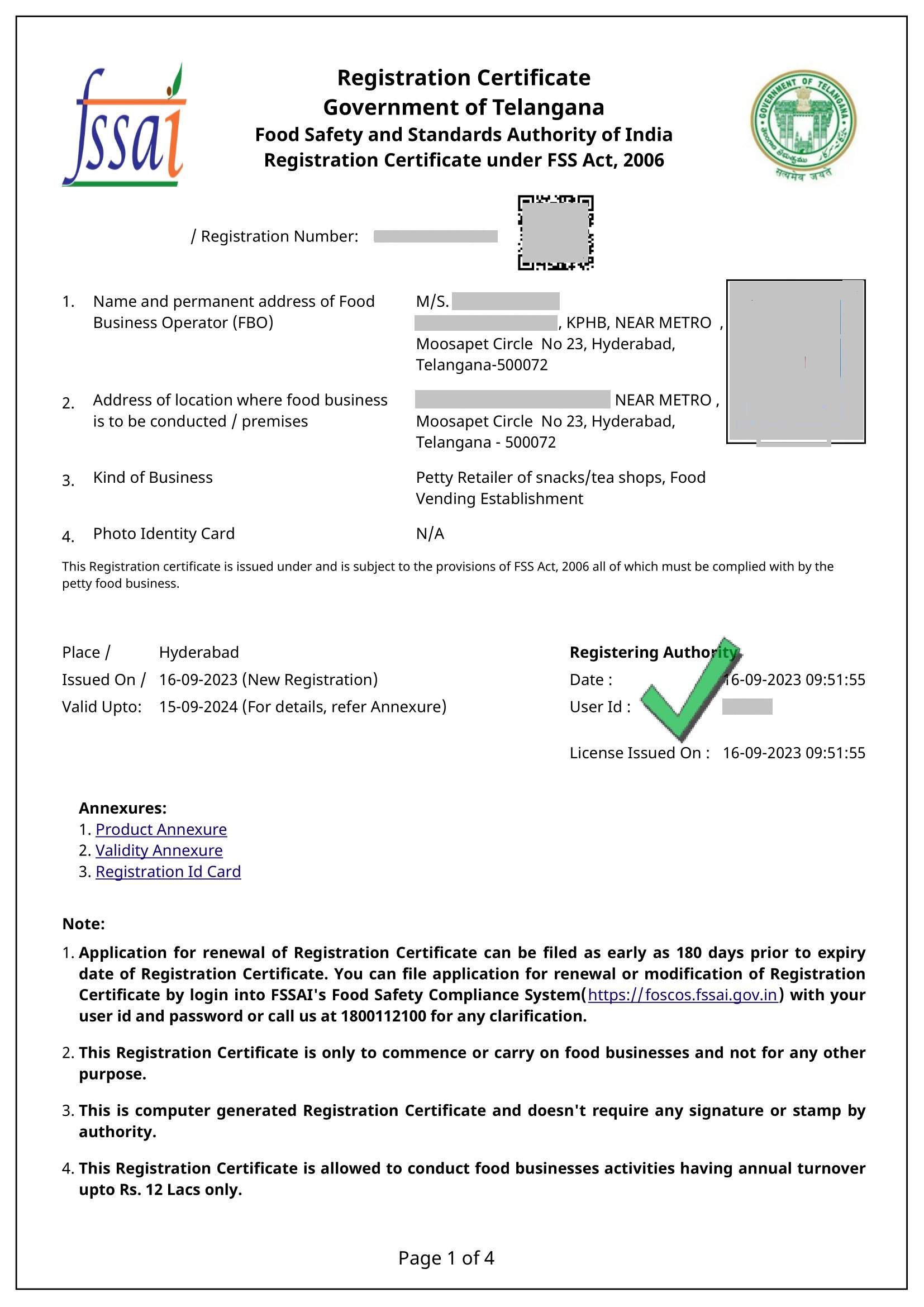Hyderabad Food License Registration: Making Food Businesses Safe and Compliant

Launching a food business in Hyderabad demands more than tasty recipes and premium ingredients. It calls for obtaining the necessary permits and meeting all food safety norms. Food license registration in Hyderabad is essential for any venture involved in producing, storing, selling, or distributing food products. It builds customer trust, keeps the business legally sound, and supports smooth functioning. With more cafes, bakeries, and food startups emerging in Hyderabad, understanding the FSSAI registration procedure and its benefits has become a must for business owners.
FSSAI Overview and Importance
The FSSAI (Food Safety and Standards Authority of India) is responsible for maintaining food quality and public health standards nationwide. It functions under India’s Ministry of Health and Family Welfare and sets standards to ensure that food is safe for consumption. Every individual managing a food enterprise, from micro food vendors to industrial manufacturers, must obtain an Hyderabad FSSAI registration before starting operations. The license acts as legal evidence of a company’s adherence to FSSAI safety and hygiene practices.
Importance of Food License Registration
The primary reason for obtaining a Hyderabad FSSAI registration is to build consumer confidence. Modern consumers are increasingly aware of food safety, and they often look for the FSSAI registration number on packaging or menus. The registration also protects the business from legal penalties, ensures adherence to quality standards, and provides recognition as an authorised food operator. Additionally, it opens opportunities for expansion via registered trade and delivery channels.
Who Needs FSSAI Registration in Hyderabad
Every business that deals with food in any capacity must obtain an FSSAI license registration in Hyderabad. This includes everything from household food brands to commercial restaurants and distributors. Even digital food platforms and franchise owners are required to comply with this regulation. Whether it’s a small homemade pickle brand or a large industrial food manufacturer, FSSAI registration ensures that the business operates legally within the framework of the Food Safety and Standards Act.
FSSAI License Types in Hyderabad
Depending on company operations and income, the FSSAI offers three types of licenses. The Entry-level FSSAI registration is meant for small food businesses with an annual turnover of up to ?12 lakhs. The State-level License applies to businesses running at state Food license registration Hyderabad level with medium revenue. The Central License is for multi-state food chains or companies exceeding ?20 crore turnover. Choosing the right FSSAI category for registration is key for avoiding legal complications.
Documents Required for Food License Registration
The documentation for FSSAI registration Hyderabad changes based on scale yet commonly needs identity and address proof of the applicant, copyright-sized photographs, proof of business premises (such as rental agreement or ownership documents), list of food products handled, and a declaration form. For factories, extra details like blueprints and local permissions may be necessary. Complete paperwork ensures quicker application approval.
Step-by-Step Process for FSSAI License Registration in Hyderabad
The process initiates with evaluating which license type fits your operations. The applicant then registers through the FSSAI website and provides necessary documentation. After the authorities review the details, followed by possible site inspection, particularly for state and central licenses. Upon approval, a valid license is granted to start lawful operations. Many businesses opt for professional services to handle food license registration Hyderabad to avoid errors and delays.
Challenges in FSSAI Registration
While obtaining an Hyderabad FSSAI license is mandatory, the process can be complex for new entrepreneurs. Common challenges include selecting the right category, providing complete and accurate documentation, and understanding compliance requirements. Errors or omissions may result in slow approvals or rejections. Therefore, businesses hire professionals who deal with Hyderabad FSSAI registration daily.
Benefits of Having an FSSAI License
A valid FSSAI license comes with several key benefits. It enhances the credibility of the business, ensuring consumers that the food is safe and hygienic. It also opens doors to business expansion, as suppliers and distributors prefer working with licensed partners. Additionally, in case of any complaints or inspections, having an FSSAI license safeguards the business from penalties and supports transparency. For local food ventures in Hyderabad, it adds significant value by positioning them as compliant and trustworthy food providers.
Renewal and Compliance Requirements
After obtaining the FSSAI Hyderabad registration, it is important to stay compliant during the license’s validity (1–5 years). Renewal should be initiated one month prior to expiration to prevent penalties. Businesses must also comply with the Food Safety Act, maintain transparency, and cooperate with audits. Routine audits and awareness sessions keep standards high.
How Professional Assistance Simplifies the Process
Given the technicalities involved, many businesses hire consultants to handle food registration in Hyderabad. Expert consultants handle the entire process—from determining eligibility, preparing documents, filling out applications, to following up with authorities—saving business owners time and effort. They ensure the process is completed efficiently and in compliance with all regulations, allowing entrepreneurs to dedicate more time to operations instead of paperwork.
Conclusion
Obtaining a Hyderabad FSSAI license is a legal necessity and an ethical business practice. It strengthens your brand’s image and customer confidence. Whether you own a startup or a well-established restaurant, securing your FSSAI food license Hyderabad ensures that your business operates smoothly and ethically within the city’s dynamic food industry.